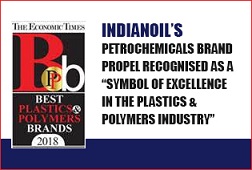Glycols
 IndianOil Mono Ethylene Glycol (MEG) plant was commissioned at Panipat Naphtha Cracker
Complex, Panipat, Haryana in April 2010, as a response to expansion in the downstream polyester sector and also in the light of liquid fuel (Naphtha) Surpluses in the Northern Sector. The fully integrated plant
uses Ethylene produced by Naphtha Cracker as the main feed Stock for manufacture of MEG.
IndianOil Mono Ethylene Glycol (MEG) plant was commissioned at Panipat Naphtha Cracker
Complex, Panipat, Haryana in April 2010, as a response to expansion in the downstream polyester sector and also in the light of liquid fuel (Naphtha) Surpluses in the Northern Sector. The fully integrated plant
uses Ethylene produced by Naphtha Cracker as the main feed Stock for manufacture of MEG.
 The MEG plant is based on the proven technology of Scientific Design Co.
USA. Ethylene Glycol is produced from Ethylene
by non-catalytic hydration of Ethylene Oxide and water at elevated temp and pressure.
The MEG plant is based on the proven technology of Scientific Design Co.
USA. Ethylene Glycol is produced from Ethylene
by non-catalytic hydration of Ethylene Oxide and water at elevated temp and pressure.
At Panipat, IOCL Glycol plant was revamped to 457 KTA in 2022 (MEG: 425 KTA; DEG: 31 KTA; TEG:1KTA) from earlier 325 KTA. Moreover, Paradip Glycol plant was commissioned in 2023 with a capacity of 357 KTA (MEG: 332 KTA; DEG: 24 KTA; TEG:1 KTA).
Application
MEG is predominantly used with PTA as a raw material in manufacture of Polyester Staple Fibres, Polyester Filament Yarns and Polyethylene Terepthalate & Biaxially Oriented Polyethylene Terepthalate films.MEG also finds vast application in chemical sector like in coolants, brake fluids, antitfreeze Alkyd Resin, Unsaturated Polyester Resin etc.
With the comissioning of MEG plant, The basket of raw materials from IndianOil for the Polyester industry becomes complete. For the last two years large quantities of MEG were being imported into the country and commissioning of IndianOil MEG facility is expected to partially meet the shortage in the country. The introduction of IndianOil in MEG business, will therefore add a fillip to the Polyester industry working, leading to higher operating capacities.
Advantages of Scientific Design Process
The proven and widely used Scientific Design process provides the following advantages:
- Better fibre grade product
- Less impurities

